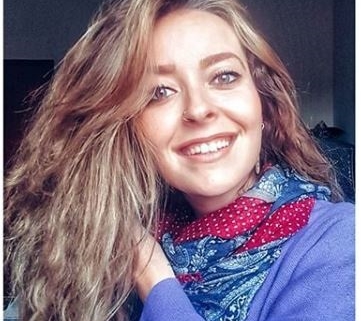Buse Cevatemre, BioRender Graphical Abstract Contest Winner
As the Crastina team has recently reported on, BioRender is running their Annual Graphical Abstract Contest. With the submission deadline long gone and votes from the public also closed, the winners are starting to trickle in! The various winners of the $50,000 worth of prizes will be announced throughout June, and the Crastina team will be interviewing some of them about their motivations, experience and tips. Here’s Buse Cevatemre, whose scientific illustration is a winner of the People’s Choice Award.

Buse Cevatemre’s entry to the BioRender Annual Graphical Abstract Contest.
Hello Buse! Very nice to interview you and congratulations on winning the People’s Choice Award on BioRender’s Annual Graphical Abstract Contest! I see you are also an Expert’s Choice Semifinalist – well done! Tell me, why did you decide to submit an entry to this contest?
Thank you Nat! I could not make it to the finals in the experts’ category, but I have acquaintances there (Ozen Leylek and Ozlem Yedier Bayram, fingers crossed girls!). I hope the voting ends in their favor!
I am a little hesitant to say this: I did not know about BioRender! My labmate shared the contest announcement in our WhatsApp group and I said why not? I always loved styling-drawing. I thought I would learn to use the program even though I could not get the prize. That is how I met BioRender.
What would you say was your biggest challenge when preparing the graphical abstract to submit for the contest? And the most gratifying or fun part of the process?
I did a lot of reading (thanks to quarantine) in the context of cancer drug resistance. Synthesizing these articles and fit them to only one slide was really challenging. I wanted to illustrate each of those beautiful perspectives. Of course, this was not possible. Finally, I decided to use a review article that could cover them all. My sweet challenge!
It has been extremely gratifying to see the beautiful comments on my work. You are processing many details to make the illustration and when people can see that it also makes you happy.
My non-scientific friends were the fun part of this journey! When I told them about the contest, they were very enthusiastic which I feel very proud and grateful for. I thank them here, again. They learned what the graphical abstract means!
Your graphical abstract on the determinants of cancer drug resistance is truly informative. Do you feel that a graphical abstract can help you enhance your ability to communicate your science?
Exactly. I think it is necessary for scientists to give a clear and attractive presentation. Otherwise, even if your results are precious, you lose people at some point. This is an important part of our work; we must accept this. Making a graphical abstract is one of the enjoyable tools for communicating your science.
Was this your first adventure on trying to communicate science in such a visual way or are you experienced in this? What are your hot tips for delivering science in the form of a graphical abstract?
As a contest, yes, first time. I love getting together for science. If we do not do that, I think there is no point in any experiments. I always use a graphical abstract in scientific meetings or in written texts such as grant applications.
Hot tips! Firstly, if I deal with something crowded, I divide it (which I did in this contest). Secondly, I determine the flow. Finally, I like to put figures which make people laugh. The rest is style dependent. Title and outputs should attract people: make them bigger, change their colors, play with their opacity!
Finally, tell us a little more about yourself and about what this prize means to you.
I always try to find calm in chaos or to keep myself patient for better mental health. My research (post-doc) life is going happy and well-balanced. I always believed in hard work and team effort. Science requires these. I am in a wonderful research group and have very good scientists around me. Together we think of an interesting question to answer – and we do things better and faster than either of us could do alone.
I think we are in a very good period in science. It is always evolving. Technology and tools are improving every day and thanks to these we accumulate a great deal of knowledge. You need to keep yourself up-to-date and constantly motivated. This award will remind me of motivated people that we are taking the same path. I learned a lot from those abstracts!
I want to specially thank my lovely family; my PI, CAA; KUTTAM lab members, Dila, İpek and Barış. They were very thoughtful in this journey. And of course, you for preparing this lovely interview!
- Turning frustration into change: Jean-Sébastien Caux, founder of SciPost - August 9, 2021
- Dr Nicola Nugent: Publishing Manager at the Royal Society of Chemistry - December 7, 2020
- Public Engagement and Trust in Science: In Conversation with Dr. Farzana Meru - November 23, 2020
- Is the peer review process trustworthy? Perspectives by Dr. Jurado Sánchez - November 4, 2020
- Prof. Maria Baghramian: Policy, Expertise and Trust in Action - October 29, 2020
- Prof. Luke Drury: ‘When Experts Disagree’ - October 5, 2020
- Are we what we hear? A reflection on sound, identity and science communication - September 27, 2020
- Sign your Science - September 22, 2020
- Raven the Science Maven - August 18, 2020
- Dr Mark Temple: DNA Sonification or when Scientist are musicians - August 5, 2020





Way to them for making that possible! They are counseled to all.